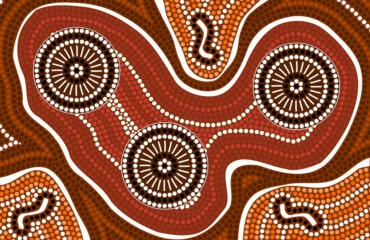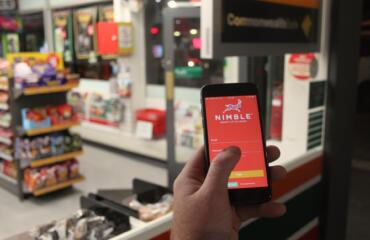In 2004 Mark Zuckerberg built online infrastructure allowing individuals across the planet to instantly trade thoughts and information online. Facebook fused our daily lives into the digital world, and we’re only just beginning to grasp the scope of its impact. Now, brace yourselves for what could be the next great disrupter – blockchain.
A revolutionary online trading technology, blockchain is the creation of a mysterious internet presence known as ‘Satoshi Nakamoto’. It emerged in 2008 with the publication of a manifesto titled ‘Bitcoin: A Peer-to-Peer Electronic Cash System’.
The document laid out the key function and aims of a system that could circumvent the money trading establishment by allowing individuals and entities operating online to shift money without banks.

A small network of tech enthusiasts were then inspired to place real monetary value on the technology’s trading tool ‘cryptocurrency’. But Satoshi was a ghost, a digital mask laying claim to a large amount of Bitcoin, unidentifiable in the real world. The instigator quickly vanished, leaving a legacy in the hands of any disciple capable of interpreting the mission and spreading its message. Over the next nine years this coder’s dream has attracted millions of users and built a global industry worth billions of dollars.
A facility called The Blockchain Centre, home to some of Satoshi’s Australian disciples, took up residence in Melbourne’s Southbank three years ago. It now offers workspace for startup business’s providing services on the Blockchain and runs seminars – some free, some at a cost – intended to educate the community on how the trade system works.
The first of many lessons for those who sign up is that for all the bamboozling technological overlay, cryptocurrency is just the latest incarnation of a hard-wired human behavior. Currency in some evolving form – stone, bronze, gilded metal, plastic or paper – has been a tool used to facilitate trade for millennia. The essential materials of history are overlaid as aesthetic symbols of value, conduits of social power – summoning innovation and greed in equal measures.
Our new world, globalized by digital technology, permits the population from all its disparate locations and economic conditions to exchange goods, labour and services. Centralized banks that provide software to record the transfer of money facilitate these trades. They also snare the universally resented “transaction fee” for their troubles.
Curious to learn more, I take a seat at one of the Blockchain Centre’s free monthly seminars. The central message is that cryptocurrency is the so-called new global currency. It exists as code buoyed on the cyber mist, without direct physical equivalence or a bank to store it. ‘Coins’ are simply the units of value that refer to this code. Many of us are now aware of Bitcoin – the progenitor, the original. It is still the presiding form, attracting more and more users by the day who seek to trade it.
Bitcoin users don’t require the central bank service. The software allows direct and decentralized trade on its network, keeping a record of included participants and the time, date and amount of transaction without the actually identity of the involved parties. This public database, or record, viewable to any of its users is called the blockchain. It seems foreign now, but is part of a future that will continue to ask for recognition and acceptance. Whether those who’ve already accepted it have been summoned by belief in the form or an instinct for profit remains the question.
“It will transform the future of the information age“: Blockchain Centre co-CEO Sam Lee.
The Blockchain Centre propounds to be bridging a knowledge gap between crypto natives and the rest of us. I attended November’s meeting hoping to learn about “Ethereum”, an application used on the blockchain and the main rival to Bitcoin. But interpreting the lingo amid coders, entrepreneurs, investors and tech enthusiasts gathered to discuss the technology in specific detail is extremely difficult – if not impossible – for the uninitiated. Material which is supposed to be explanatory is riddled with strange cryptography vocabulary and mysterious acronyms. They’re used as shorthand for the relevant software as well as a string of accompanying trade behaviors.
Employees Jason and Nelson let me in on the joke after the session as they gleefully reel off some of their personal favorites. “FUD” – which stands for fear, uncertainty and doubt – describes the experience of that emotional combination when trading.
“HODL”, Nelson tells me, was coined on a popular Reddit forum where crypto-enthusiasts meet to discuss their experiences and harness the crypto culture. A Google search corroborates that the originator was posting while drunk on whisky and simply misspelled “hold”. The typo was adopted and is now dialect for not selling coins when things appear unstable, or, holding on for dear life. The pair’s favourite, they tell me in sync after an impish chuckle, is “WHENLAMBO” – the hope that your coins will one day buy you a Lamborghini.
The interview has become an induction into the new business era – a magic window of opportunity, if only I’m smart (poor or desperate) enough to realize it.
I’d organized an interview with the CEOs of the Blockchain Global Centre, Sam Lee and Martin Davidson after the seminar, and inside the centre’s glass walled meeting room, Lee comes out with more crypto shtick, unprompted. “Do you know what PSD means? It means poor, smart and desperate.” Apparently these are helpful traits for somebody trying to make it in a business.
Lee speaks confidently, and perhaps a little sentimentally about the promise of the blockchain: “It will transform the future of the information age.”
But his business partner Davidson, whose aura is more one of discretion and personal detachment, describes it as a “socio-technological experiment”. He comes from a telecommunication sales background and only pursued the crypto-economy after realizing a need, or desire to buy property. Dalliances in the traditional stock exchange ultimately lead him to Bitcoin and he now runs the ‘Bitcoin 101’ seminars at the centre to introduce the basics of the software and advertise “ICOs” (initial coin offerings) to budding crypto-traders.
An ICO is similar to the IPO (initial public offering) of regular stock industries in that fundraising is the key aim. But different in that the receiver of the ICO is given a portion of the asset (Bitcoin) itself in exchange for their money, rather than company stock. The danger of course being that despite its current allure, the cryptocurrency market is uniquely volatile relative to normal trade. ICOs are currently the most effective way to attract new users, and the pamphlets were spread everywhere through the office.
Pairing this thought with all the preceding clichés and faux-corporate catch phrases, listening to Lee and Davidson give their spiel, it all begins to feel more like persuasion than education. The interview has become an induction into the new business era – a magic window of opportunity, if only I’m smart (poor or desperate) enough to realize it.
But the money to be made is the least interesting part of the magic. Lee became involved with cryptocurrency during its embryonic phase, pre-2014. In 2011, two years after Satoshi Nakamoto developed the code, he had dropped out of RMIT and was given 180 Bitcoins by a friend who couldn’t afford the $18 he owed for a lunch. Upon learning they were potentially worth something, the “libertarian and cypherpunk” concepts that informed Nakamoto captured his interest.
The ideas were drawn principally from the “Cypherpunk Manifesto”, a document penned in 1993 calling for the building of anonymous systems online: “We are defending our privacy with cryptography, with anonymous mail forwarding systems, with digital signatures, and with electronic money.”
Lee became part of a “core group of believers” based in Melbourne, hobbyists who’d gather at Double Happiness, a laneway bar in Melbourne’s CBD, to discuss the notion of privately operating on the internet, away from the eye of the state and without the redundant preconditions of the bank. “It felt like we were apart of something bigger. A movement, a secret society that understood and could see the future for what it was going to become.”
At the time of those first online exchanges, Bitcoins were being traded at $2 a piece. As the cursor blinks on this page as we go to air, you can buy one coin for AU$21,969.05 according to the Bitcoin Price Index, leaving the total value of circulating coins at more than AU$200 billion. The leading alternative to Bitcoin is the ‘Ether’ which, after less than two years on the market, is sitting at AU$1076.82 a piece.
As the ecosystem has grown, different mainstream industries have begun to notice how the blockchain applies to their businesses and approached the platform with different motivations. Lee tells me that often when investors notice financial gain they may attempt to learn about the technology, but ultimately their interests lie in trading, which distracts away from the initial cultural goals and leaves the overall value of the technology unpredictable.
The Blockchain Centre’s leadership duo symbolize this tension: Lee the cypherpunk and Davidson the investor, different sides of the Bitcoin, so to speak. On one side, a new tool to subvert government power and reorganize the way society interacts with information technology; on the other a quick-trading opportunity for the money-hungry. So while the centre’s central mission is to help the public embrace cryptocurrency, they make the pitch from very different philosophical positions.
Despite the high value figures and his own passion, Lee acknowledges that the cooperation of existing institutional frameworks with the developers could help secure a future for the sector. We may not see a “swift revolution” wiping out conventional banking in a couple of decades, but rather new applications for the blockchain that strengthen and build upon our existing economic structures and simply offer cryptocurrency as an optional asset class to go with it.
The blockchain is in fact a diverse space already. Some of the startups at the centre don’t deal with financial currency at all – an app called Blockgrain uses blockchain ledgering to manage supply chain logistics for agricultural companies. The University of Melbourne is one of the first in the world to trial blockchain technology to store student credentials, enabling employers to verify job applicants’ tertiary qualifications at speed.
Because of this versatility, several of the world’s largest economies have started to take notice and embrace the technology. Japan made the move to legalization this year, and along with South Korea has quickly become a key market driver. In Bitcoin’s pioneering years, many governments were concerned about its ability to be used anonymously, and legislated against it to prevent money launderers concealing their illicit activity on the blockchain. Despite China’s recent attempt to reduce bitcoin acquisition by banning ICOs, demand is still high and private trade is strong.
Until recently Russia jailed Bitcoin users, but its position on cryptocurrency’s general utility has seemed to shift continually. The Deputy Finance Minister Alexey Moiseev’s announced in October that Russia would legally recognize Bitcoin and other cryptocurrencies in 2018.
Vladimir Putin himself has also has expressed his interest, calling this “digital economy” the “foundation for creating brand new business models” at the St Petersburg Economic Forum.
In pursuing the blockchain, Putin is seeking to diversify the Russian economy, after its oil and gas prices dropped and the United States and European Union imposed sanctions that cut foreign investment in their assets. Russia is also struggling with serious corruption issues, with regional banks laundering money. Minister Moiseev has said the blockchain would improve the monitoring of these kinds of transactions in real time. “The state needs to know who at every moment of time stands on both sides of the financial chain.”
Russia’s interest in blockchain technology indicates a potential future for cryptocurrency. A future that, ironically, would use the same online system, designed to bypass Governments and banks in pursuit of privacy and independent efficiency, to establish broader economic security. But this assumes North Korean hackers and the like inspire a pursuit of deeper cyber security, as opposed to more sophisticated cyber warfare.
If cryptocurrency is judged to have the utility necessary to become mainstream, it will need the backing of governments to drive public trust and usage. It will also need a flourishing private sector that can investigate the best ways to modernize and improve our expanding online activities. Cooperation at these two levels seems important.
What the rest of us should do in the meantime isn’t obvious just yet. Wait around for old school power to maturely compare notes with new school technology? Defy the experts and join the rush? Or, perhaps attend another seminar?



